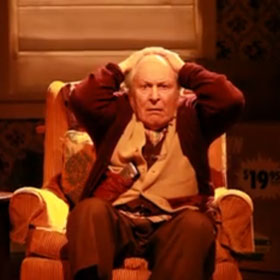'The Hatmaker's Wife' Review: A Touching Play Of Tragic Family Fantasy

5/5
The Hatmaker’s Wife, a new play written by Lauren Yee and directed by Rachel Chavkin is an incredibly moving piece about the intersection of family and identity. The Hatmaker’s Wife stars David Margulies as Hetchman (the Hatmaker), an old, grumpy man who is so consumed by his own comfort that he forgets to be a good husband to his loving wife. All Hetchman cares about is his hat.
The story of Hetchman and his wife is told through the walls of their old house, now inhabited by a young couple. The wall, a witness to all that has happened within her, delivers pages of the story to the young woman, an orphan, who feels disconnected from family and people in general. The fantastical element of a talking wall might seem out of place, but instead it feels magical and wonderful. The talking wall does not transport the play into a fantastical universe, it brings fantasy and magic into our universe (the ordinary world established in the beginning of the play).
The walls and set remain constant throughout the play, but Chavkin uses creative lighting and music to break down the limitations posed by the walls of the Hetchman home. Silhouettes help the voice wall come alive visually, and the whimsical music helps ground the characters. The set seems to move through time (from the Hetchmans to the younger couple) organically, even with the talking walls.
The Hatmaker’s Wife is not so much fantasy as it is truth. Fantastical elements appear throughout the play, but they don’t appear out of place. Yee introduces each supernatural element with ease, making them a natural part of the play as opposed to something extra imposed onto the real world by the playwright. The result is a play that will make you dream up a new way of looking at the world (and the families) around you.
There is one particularly amazing moment in which Meckle, Hetchman’s next-door neighbor and best friend, played by Peter Friedman, appears on the side of the stage and explains the saying “love you to the ground.” A baby doll is lowered from the rafters down to the stage: a child sent by God to a couple. If the child is not loved strongly enough, then it will eventually float away, back up to the sky and leave the couple forever. And so, they say that you must love a person to the ground to keep them with you. This aside is particularly touching for many reasons, not least of which is the beautiful sentiment. The reason I bring it up is because it perfectly illustrates the genius of The Hatmaker’s Wife: Meckle speaks directly to the audience for the explicit purpose of explaining what is happening on stage, essentially separating the world the audience inhabits from that of the play. However, the effect is the opposite; the simple, direct staging and writing, coupled with Friedman’s honest performance, invites the audience to become a part of the play.
All the actors give solid performances, but Macia Jean Kurtz, as Hetchman’s Wife, is a standout. Kurtz’ every line and gesture is executed with a heartbreaking sensitivity. And she shines as the beating heart of the play. Every time she is on stage, all eyes are on her. As the play moves forward and Hetchman’s Wife reveals more of her feelings to those around her, Kurtz slowly works herself up emotionally with beautiful precision, making her tears feel earned instead of dramatic.
The Hatmaker’s Wife is an excellent play specific to the magic of the theater; beautiful, enchanting and awe-inspiring to witness performed on stage.
The Hatmaker's Wife also stared Stephanie Wright Thompson, Frank Harts and Megan Byrne.
Get the most-revealing celebrity conversations with the uInterview podcast!



 by
by 



Leave a comment